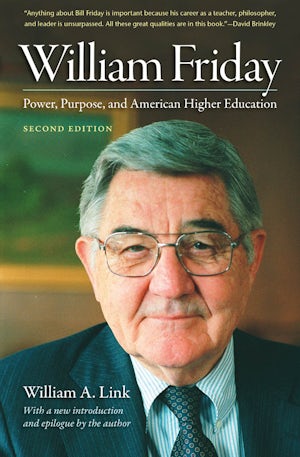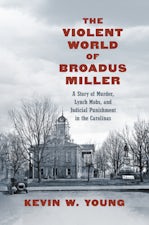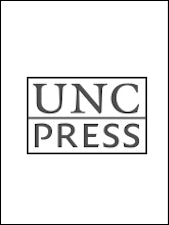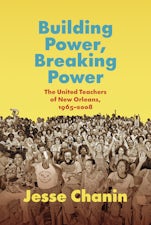William Friday
Power, Purpose, and American Higher Education
Second Edition
By William A. Link
With a new introduction and epilogue by the author
544 pp., 6.125 x 9.25, 30 halftones, notes, bibl., index
-
Paperback ISBN: 978-1-4696-1185-3
Published: October 2013 -
E-book PDF ISBN: 979-8-8908-4700-3
Published: October 2013 -
E-book EPUB ISBN: 978-1-4696-1186-0
Published: October 2013
Buy this Book
- Paperback $29.95
- E-Book $19.99
For Professors:
Free E-Exam Copies
Friday's thirty years as president of the university, from 1956 to 1986, spanned the greatest period of growth for higher education in American history, and Friday played a crucial role in shaping the sixteen-campus UNC system during that time. Link also explores Friday's influential work on nationwide commissions, task forces, and nonprofits, and in the development of the National Humanities Center and the growth of Research Triangle Park.
This second edition features a new introduction and epilogue to enrich the narrative, charting the later years of Friday's career and examining his legacy in North Carolina and nationwide.
About the Author
William A. Link is Richard J. Milbauer Professor of History at the University of Florida. He is author or editor of fourteen books, including Atlanta, Cradle of the New South: Race and Remembering in the Civil War’s Aftermath.
For more information about William A. Link, visit
the
Author
Page.
Reviews
"A book that should be read by anyone interested in the role that a president does and can play in heading an institution of higher learning. . . . An engrossing account."--Choice
"William A. Link's sensitive portrayal of Friday's pivotal role in the shaping of North Carolina's university system and in the development of higher education nationally is informative and even inspirational."--Journal of American History
"Should be required reading for students of modern American history, civil rights policy, public law litigation, and the politics of higher education."--Journal of Southern History
"All Tar Heels . . . will benefit from reading this book."--The State
"An important resource that will be invaluable when historians begin to write the history of post-World War II American higher education."--History of Education Quarterly
"A well-written and professionally crafted biography of a major figure in post-World War II higher education. It will be an essential building block for the sorely needed history of American colleges, professional schools, and universities since the mid-1960s."--American Historical Review




